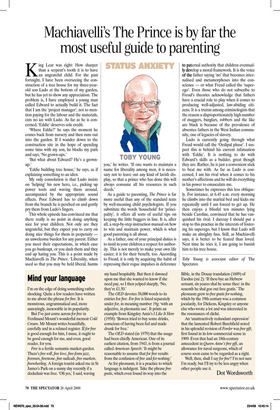Mind your language
I’m on the edge of doing something rather shocking. Quite a few readers have written to me about the phrase for free. It is monstrous, ungrammatical and, more annoyingly, inexorable in its popularity.
But I’ve just come across for free in Ferdinand Mount’s wonderful memoir Cold Cream. Mr Mount writes beautifully, carefully and in a relaxed register. If for free is good enough for him, I muse, it ought to be good enough for me, and even, good reader, for you.
Free is a fertile semantic market-garden. There’s free will, free love, free-form jazz, freemen, freestone, free radicals, free markets, freewheeling. A foreign tourist asked me in St James’s Park on a sunny day recently if a deckchair was free. ‘Oh yes,’ I said, waving my hand hospitably. But then it dawned upon me that she wanted to know if she need pay, so I then yelped sharply, ‘No, they’re £1.50.’ The OED devotes 38,000 words to its entries for free. For free is listed separately under for, in meaning number 19g: ‘with an adjective, in pleonastic use’. It prints an example from Kingsley Amis’s I Like It Here (1958): ‘Bowen tried to buy some drinks, conscious of having been fed and made drunk for free.’ The OED stated (in 1979) that the usage had been chiefly American. One of its earliest citation, from 1943, is from a journal called American Speech: ‘It might be reasonable to assume that for free results from the confusion of free and for nothing.’ As for pleonasm, it is a practice to which language is indulgent. Take the phrase free gratis, which even found its way into the Bible, in the Douay translation (1609) of Exodus (xxi 2): ‘If thou bye an Hebrew seruant, six yeares shal he serue thee: in the seuenth he shal goe out free gratis.’ The pleonasm grew to free gratis for nothing, which by the 19th century was a common jocularity, for Dickens, Kingsley or anyone else who wrote a lot and was interested in the resonances of cliché.
An ‘unattractively redundant expression’ that the lamented Robert Burchfield noted in his splendid revision of Fowler was free gift, first found in its low commercial sense in 1909. Even that had an 18th-century antecedent in Queen Anne’s free gift, an allowance for naval surgeons, which of course soon came to be regarded as a right.
Well, then, shall I say for free? I’m not sure I’m ready, but I’ll try to be less angry when other people use it.
Dot Wordsworth










































































 Previous page
Previous page